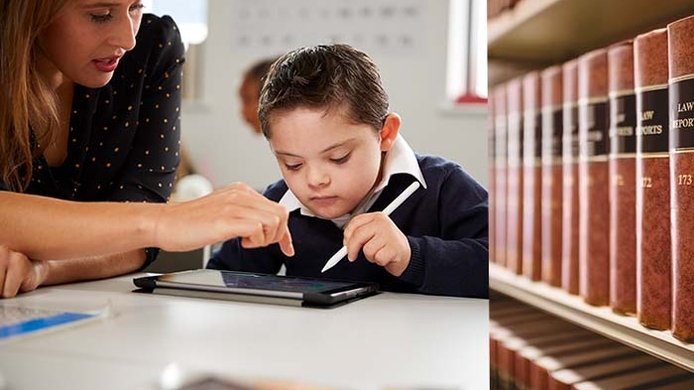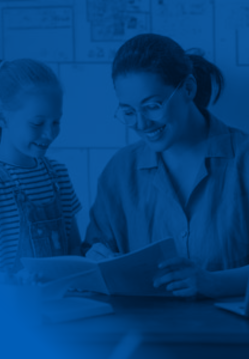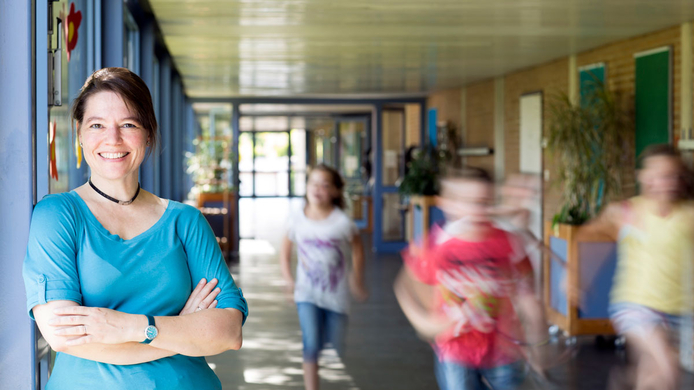Explore our resources for teaching and education degrees and learn about career options that fit your future.

Becoming a special education teacher isn't so much a job as a calling. Educating and helping autistic and other special needs students isn't for everyone. It takes a skill set beyond classroom knowledge. Plus, it requires an understanding of the current laws and policies surrounding special education.
According to data from the National Center for Education Statistics (NCES), there are about 7.5 million students aged 3 to 21 receiving special education services in the U.S. — 15 percent of all public school students. Special education students have distinct needs and rely on a teaching environment tailored to them. To address that, our nation's schools have evolved over the years to refine their approaches to educating special needs students.
It's hard to believe, but prior to 1975 there were no national laws governing or mandating special education for students with disabilities in the U.S. That changed in 1975 with the Education for All Handicapped Children Act (EHA) and expanded in 1990 with passage of the Individuals with Disabilities Education Act (IDEA).
In this blog, let's get into these laws, as you'll need to understand them when entering the field of special education. Plus, let's explore some traits that are important for special education teachers to be successful and fulfilled in this sector of teaching.
Are You a Good Fit for Special Education?
Before we get into some of the laws in this unique area of education, you'll need to feel that you can see yourself as a special education (SPED) teacher. At the middle school or high school level, the skills/traits considered necessary to be a successful SPED teacher are similar, according to the U.S. Department of Labor.
Through ONET Online, a comprehensive web-based application that provides access to the Department of Labor's ONET database, the public can research detailed information about a huge variety of occupations, among them special education teaching. When researching middle and high school special ed teachers on ONET Online, you'll find 17 skills needed to succeed in the position. Here are seven of those 17 skills.
- Active listening — Giving full attention to what other people are saying, taking time to understand the points being made, asking questions as appropriate, and not interrupting at inappropriate times. These interactions can help students with special needs feel hear and also help them learn about the impact things like body language, hand gestures, eye contact, and voice inflection can have on others.
- Complex problem solving — There is no one-size-fits all curriculum that is going to work for every special education student. This makes complex problem solving an important skill, assessing varying needs and adapting your teaching to them. This trait is most often used when developing and implementing Individualized Education Plans (IEPs) for special education students.
- Service orientation — To succeed as a SPED teacher, you need what the Department of Labor calls a "service orientation." This is a desire to continually look for ways to help others. This trait allows SPED instructors to cope with the drudgery of paperwork, meetings, and protective parents, gaining satisfaction from breakthrough moments with students.
- Social perception — To have social perception is the ability to be aware of others' reactions and understanding where these reactions are coming from. With special needs students, you'll need to make accurate inferences based on their verbal and nonverbal communication cues.
- Learning strategies — Special education classrooms are typically filled with various comprehension levels and learning styles. To accommodate every student, SPED teachers need to select and use different instructional styles.
- Critical thinking — As with problem solving, special education teachers also need to use logic and reasoning to identify the strengths and shortcomings of various solutions, conclusions, or approaches to problems and instruction.
- Persuasion — Special needs students can be strong-willed and stubborn, sometimes lacking the social skills that tamp down these tendencies. To reach these students, teachers need to have persuasion skills to overcome resistance and change mindsets and behaviors.
Elementary and early childhood special education teachers require many of the same traits as those listed above. The main difference is what is being taught and observed in students. Early childhood special education teachers focus on recognizing the signs of various developmental delays, while elementary special education teachers focus on teaching basic skills and concepts for future learning.
Understanding Special Education Laws
As mentioned above, in 1975 the special education landscape improved dramatically with the passage of the Education for All Handicapped Children Act (EHA). It required all public schools accepting federal funds provide equal access to education for children with physical and/or mental disabilities.
This law, and others that followed, created a shift toward a more inclusive classroom structure that allowed special needs students to learn in the general education environment alongside their peers. Whereas students with disabilities previously were basically segregated from their general education peers, now classes are a mixture of learning levels, where general education and special education educators co-teach all students in the same class.
This requires teachers — both general education and special education — understand the parameters of these laws so they can adhere to them and provide the highest level of education possible. Here's an overview of some key special education regulations.
The Education for All Handicapped Children Act (EHA)
Originally passed in 1975, the Education for All Handicapped Children Act (frequently referred to as Public Law 94-142) paved the way for special education as we know it today. Before 1975, only a few small districts provided education for students with disabilities in the U.S. To receive funding for special education today, states must comply with the law.
The EHA made it mandatory for public schools to evaluate children with disabilities and create individual education plans that mirror the educational experiences of non-disabled students while accommodating their unique needs. The EHA had four key goals:
- To ensure that special education services are available to children who need them.
- To guarantee that decisions about services to students with disabilities are fair and appropriate.
- To establish specific management and auditing requirements for special education.
- To provide federal funds to help states educate students with disabilities.
The Handicapped Children's Protection Act (HCPA)
While the EHA mandated that all public schools receiving financial support from the federal government provide special-needs students with non-discriminatory access to all educational programs, the Handicapped Children's Protection Act (HCPA) of 1986 was created to add provisions not covered by the EHA. For example, the EHA does not directly address legal cost relief available for parents who prevail in lawsuits based on violations of EHA provisions.
The HCPA emanated out of the United States Supreme Court's ruling in the 1984 case Smith v. Robinson. It was found that existing enforcement mechanisms of disability rights did not cover how, when, and/or where legal costs are to be resolved. The HCPA amended the EHA to authorize the award of reasonable attorneys' fees, expenses, and costs to the parents or guardians of a handicapped child or youth who is the prevailing party in a civil suit to protect the child's right to FAPE.
The Individuals with Disabilities Education Act (IDEA)
In 1990, the EHA was updated and expanded to become the Individuals with Disabilities Education Act. The following six pillars are what IDEA ensures:
- Public schools are required to create an Individualized Education Program (IEP) for each student who is found to be eligible for special education services. IEPs must be designed to meet the unique educational needs of that child in the least restrictive environment appropriate.
- To the maximum extent appropriate, IDEA ensures that all students are allowed to learn in the Least Restrictive Environment (LRE) — an inclusive classroom environment in which a special needs student can achieve the most academic success.
- Free Appropriate Public Education (FAPE) is an educational right that ensures education and related services are designed to meet handicapped persons' individual needs as adequately as the needs of non-handicapped persons.
- IDEA includes a set of procedural safeguards designed to protect the rights of children with disabilities and their families, and to ensure that all special-needs students receive FAPE. The safeguards include the opportunity for parents to review their child's full educational records, the right of parents to request an independent educational evaluation, and more.
- IDEA ensures the use of appropriate evaluation processes. This minimizes the number of misidentifications, provides a variety of assessment tools and strategies, prohibits the use of any single evaluation as the sole criterion, and prohibits evaluation measures that are racially or culturally discriminatory.
- Cross-collaboration is key for a student to receive the education necessary for success. IDEA enables parents, teachers, school psychologists, and other relevant parties to work in tandem when developing IEPs, determining the proper LRE, and discussing other important considerations for each student.
The Assistive Technology Act
Originally enacted in 1998, the Assistive Technology Act was reauthorized in 2004. It provides assistive technology to persons with disabilities so they can more fully participate in education, employment, and daily activities on level playing fields with other people in their communities. Under the law, each U.S. state receives a grant to fund Assistive Technology Act Programs (ATAP) that provide services to persons with disabilities for their entire lives. The 56 ATAPs created under the law provide a place where users can go for product demonstrations, low-cost loans for their purchases, and information on these products.
The Assistive Technology Act of 2004 set forth a core set of program services to increase consistency across the country. As a result, at least 60 percent of the funds each state's assistive technology program receives must support the following:
- State financing activities
- Device reutilization programs
- Device loan programs
- Device demonstration programs
Special Education Programs at UMass Global
Special education teachers are a critical component of the education system, and with the ongoing teacher shortage they are in higher demand than ever. If you think special education could be your calling, UMass Global has programs you need to investigate. From a Master of Arts in Education, Autism to a Master of Arts in Special Education, Teaching and Learning, a Master of Arts in Teaching, Preliminary Education Specialist, Extensive Support Needs Credential to Added Authorization, Autism Spectrum Disorders, we have a variety of programs designed to train effective special education instructors.
For more general information, check out our School of Education or give us a call at (800) 746-0082 to speak with an Enrollment Coach.








